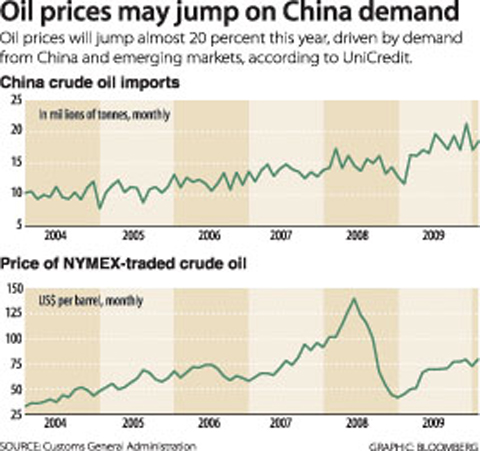Commodities mainly fell this week as traders digested an EU plan to tackle the Greek debt crisis, alongside news of moderately weaker economic growth in the US, a key consumer.
“Most commodity markets [were] lower, weighed primarily by broader market concerns,” Barclays Capital analysts said in a research note to clients.
“Lingering concerns on sovereign risk in the euro area and a smattering of mixed US macro-economic data have all affected the trajectory of commodity price movements,” they added.

OIL: Prices fell at the start of the week, before attempting a brief recovery as the US dollar weakened, but drifted lower on Friday as traders mulled the Greek rescue deal and the US economic growth outlook.
Oil had fallen earlier in the week as traders also tracked US demand worries as a government inventory report showed a jump in American crude inventories.
The US government’s Department of Energy said in its weekly inventory report on Wednesday that crude oil inventories rose 7.2 million barrels last week, confounding expectations of an increase of 1.7 million barrels.
By late on Friday on the New York Mercantile Exchange, Texas light sweet crude for delivery in May sank to US$79.82 compared with US$80.29 a week earlier for the expired April contract.
On London’s IntercontinentalExchange, Brent North Sea crude for May delivery dipped to US$79.05 from US$79.66 a week earlier.
PRECIOUS METALS: The prices of all precious metals declined.
By Friday on the London Bullion Market, gold eased to US$1,096 an ounce from US$1,105 the previous week.
Silver dipped to US$16.85 an ounce from 17.31.
On the London Platinum and Palladium Market, platinum edged down to US$1,596 an ounce from US$1,617.
Palladium fell to US$458 an ounce from US$476.
BASE METALS: Base or industrial metals diverged, despite growing hopes of a recovery in demand.
“There is a growing body of evidence to suggest that the biggest ever recovery in global base metals demand is taking shape,” Barclays Capital analysts said.
“Skepticism over the sustainability of this recovery and, in some cases, total blind-sidedness over any recovery at all, means that prices have yet to fully reflect what are turning into very positive demand dynamics indeed,” they said.
By Friday on the London Metal Exchange, copper for delivery in three months rose to US$7,512 a tonne from US$7,419 the previous week. Three-month aluminum dropped to US$2,230 a tonne from US$2,252.
GRAINS AND SOYA: Grains and soya prices weakened.
By Friday on the Chicago Board of Trade, maize for delivery in May dipped to US$3.57 a bushel from US$3.74 the previous week.
May-dated soyabean meal — used in animal feed — dropped to US$9.45 from US$9.61.
Wheat for May was down to US$4.66 a bushel from US$4.83.

Taiwanese actress Barbie Hsu (徐熙媛) has died of pneumonia at the age of 48 while on a trip to Japan, where she contracted influenza during the Lunar New Year holiday, her sister confirmed today through an agent. "Our whole family came to Japan for a trip, and my dearest and most kindhearted sister Barbie Hsu died of influenza-induced pneumonia and unfortunately left us," Hsu's sister and talk show hostess Dee Hsu (徐熙娣) said. "I was grateful to be her sister in this life and that we got to care for and spend time with each other. I will always be grateful to

UNITED: The premier said Trump’s tariff comments provided a great opportunity for the private and public sectors to come together to maintain the nation’s chip advantage The government is considering ways to assist the nation’s semiconductor industry or hosting collaborative projects with the private sector after US President Donald Trump threatened to impose a 100 percent tariff on chips exported to the US, Premier Cho Jung-tai (卓榮泰) said yesterday. Trump on Monday told Republican members of the US Congress about plans to impose sweeping tariffs on semiconductors, steel, aluminum, copper and pharmaceuticals “in the very near future.” “It’s time for the United States to return to the system that made us richer and more powerful than ever before,” Trump said at the Republican Issues Conference in Miami, Florida. “They

TAIWAN DEFENSE: The initiative would involve integrating various systems in a fast-paced manner through the use of common software to obstruct a Chinese invasion The first tranche of the US Navy’s “Replicator” initiative aimed at obstructing a Chinese invasion of Taiwan would be ready by August, a US Naval Institute (USNI) News report on Tuesday said. The initiative is part of a larger defense strategy for Taiwan, and would involve launching thousands of uncrewed submarines, surface vessels and aerial vehicles around Taiwan to buy the nation and its partners time to assemble a response. The plan was first made public by the Washington Post in June last year, when it cited comments by US Indo-Pacific Commander Admiral Samuel Paparo on the sidelines of the Shangri-La Dialogue

REMINDER: Of the 6.78 million doses of flu vaccine Taiwan purchased for this flu season, about 200,000 are still available, an official said, following Big S’ death As news broke of the death of Taiwanese actress and singer Barbie Hsu (徐熙媛), also known as Big S (大S), from severe flu complications, the Centers for Disease Control (CDC) and doctors yesterday urged people at high risk to get vaccinated and be alert to signs of severe illness. Hsu’s family yesterday confirmed that the actress died on a family holiday in Japan due to pneumonia during the Lunar New Year holiday. CDC Deputy Director-General Tseng Shu-hui (曾淑慧) told an impromptu news conference that hospital visits for flu-like illnesses from Jan. 19 to Jan. 25 reached 162,352 — the highest